 On Tuesday, January 17th, our class went to the Tenement Museum to simulate what it would have been like to be tenement inspectors. Below are some news articles describing the experience.
On Tuesday, January 17th, our class went to the Tenement Museum to simulate what it would have been like to be tenement inspectors. Below are some news articles describing the experience.
 Houses These Days!
By Bailey Wolfman
NEW YORK- Today inspectors were looking at 97 Orchard Street. On 97 Orchard Street there are 5 floors and around two to three families on each floor. There were around two to three rooms in each tenement.
“The houses are filthy. They have cockroaches and mice everywhere! There is so much trash in the hallway that people were tripping down the stairs from it,” said an inspector. “The building is a disaster, with so many people breaking the laws,” said another inspector.
When the inspectors visited the first house there was a pregnant woman named Rachel. She told the inspectors that she hasn’t had running water for three weeks! She also exclaimed that her child would not use the bathroom because she was getting knocked down the stairs by people tripping over garbage.
The inspectors had a talk with the owner of the building. She is having a very hard time because she is spending so much money on all the problems in the building. She has heard chickens and has asked the apartment people if they had a chicken. She still has not seen the chicken, but she does hear it. As the inspectors left the building a inspector said, “How bad can houses get these days?”
Houses These Days!
By Bailey Wolfman
NEW YORK- Today inspectors were looking at 97 Orchard Street. On 97 Orchard Street there are 5 floors and around two to three families on each floor. There were around two to three rooms in each tenement.
“The houses are filthy. They have cockroaches and mice everywhere! There is so much trash in the hallway that people were tripping down the stairs from it,” said an inspector. “The building is a disaster, with so many people breaking the laws,” said another inspector.
When the inspectors visited the first house there was a pregnant woman named Rachel. She told the inspectors that she hasn’t had running water for three weeks! She also exclaimed that her child would not use the bathroom because she was getting knocked down the stairs by people tripping over garbage.
The inspectors had a talk with the owner of the building. She is having a very hard time because she is spending so much money on all the problems in the building. She has heard chickens and has asked the apartment people if they had a chicken. She still has not seen the chicken, but she does hear it. As the inspectors left the building a inspector said, “How bad can houses get these days?”
 Chicken Inspectors
By Makeda Brodie
NYC- The landlady of 97 Orchard Street said, “I am thinking I am hearing chickens.” Many immigrants have complained over time about the tenements that they are living in. The government has tried to fix them over time but we still have not found those chickens.
Most of the landlords or landladies have been no help at all. Telling people, “If you don’t like it, move.” But most immigrants have to suffer the consequences of a tenement
The government has tried to help but they have not been much help. They have passed laws about this but not enforced them. This does not take note of the rude landladies and lords that will not do any for the building. The government finally decided to send out inspectors to inspect the building. The inspectors talked to ladies and lords and the tenants staying there to see if the building passed inspections based on the laws.
One of the tenants that the inspectors talked to was Rebecca an immigrant from Russia. She says, “The lights go out easily and when my daughter goes out in the hall to go to the bathroom people walking down the stairs fall on her.” There are many disturbing things in this quote but one is that the bathroom is in the hallway. Some people get so fed up with the long lines and the ones that constantly don’t work that they use a bucket. So don’t leave your clothes hanging outside because they throw them out the window.
One of the inspectors said, “We are here to help but I have to admit it is pretty horrific.” Hopefully the inspectors can help improve the tenements. For now hope the tenants don’t see any chickens running around.]]>
Chicken Inspectors
By Makeda Brodie
NYC- The landlady of 97 Orchard Street said, “I am thinking I am hearing chickens.” Many immigrants have complained over time about the tenements that they are living in. The government has tried to fix them over time but we still have not found those chickens.
Most of the landlords or landladies have been no help at all. Telling people, “If you don’t like it, move.” But most immigrants have to suffer the consequences of a tenement
The government has tried to help but they have not been much help. They have passed laws about this but not enforced them. This does not take note of the rude landladies and lords that will not do any for the building. The government finally decided to send out inspectors to inspect the building. The inspectors talked to ladies and lords and the tenants staying there to see if the building passed inspections based on the laws.
One of the tenants that the inspectors talked to was Rebecca an immigrant from Russia. She says, “The lights go out easily and when my daughter goes out in the hall to go to the bathroom people walking down the stairs fall on her.” There are many disturbing things in this quote but one is that the bathroom is in the hallway. Some people get so fed up with the long lines and the ones that constantly don’t work that they use a bucket. So don’t leave your clothes hanging outside because they throw them out the window.
One of the inspectors said, “We are here to help but I have to admit it is pretty horrific.” Hopefully the inspectors can help improve the tenements. For now hope the tenants don’t see any chickens running around.]]>
Monthly Archives: January 2017
Friday, January 20: Inauguration Day


 On Friday, January 20, our fourth grade class spent the day watching, listening, thinking, talking, writing, and creating in response to the transition of power and the installation of the next president, Donald Trump. Because emotions were elevated, students were encouraged to write their observations and ideas down in social studies’ notebooks – to supplement our group discussions. Snippets from students’ journals can be found below.
On Friday, January 20, our fourth grade class spent the day watching, listening, thinking, talking, writing, and creating in response to the transition of power and the installation of the next president, Donald Trump. Because emotions were elevated, students were encouraged to write their observations and ideas down in social studies’ notebooks – to supplement our group discussions. Snippets from students’ journals can be found below.
Our day unfolded like this:
9:00am: In the morning we watched President Obama’s Farewell Speech. We discussed the content of his speech in our morning meeting and wrote about it. We spent some focused time thinking about this section:For 240 years, our nation’s call to citizenship has given work and purpose to each new generation. It’s what led patriots to choose republic over tyranny, pioneers to trek west, slaves to brave that makeshift railroad to freedom. It’s what pulled immigrants and refugees across oceans and the Rio Grande, pushed women to reach for the ballot, powered workers to organize. It’s why GIs gave their lives at Omaha Beach and Iwo Jima; Iraq and Afghanistan – and why men and women from Selma to Stonewall were prepared to give theirs as well.11:15am: Extra recess, we needed to run, twirl and play in order to do the hard work of trying to understand current events.
 11:40am: We gathered with the other fourth grade class in the tech lab and watched the inauguration. A journalism student from Columbia University joined us. She was working on a radio story about children and the inauguration. Again, students took notes.
12:25pm: We had a whole grade meeting where students shared their responses to the inauguration.
11:40am: We gathered with the other fourth grade class in the tech lab and watched the inauguration. A journalism student from Columbia University joined us. She was working on a radio story about children and the inauguration. Again, students took notes.
12:25pm: We had a whole grade meeting where students shared their responses to the inauguration.
 1:50pm: After recess we watched a video produced by a group of artists including Shepard Fairey which outlined their collective response to the Trump presidency. Their campaign is called We the People. Together they are the Amplifier Foundation.
2:15-3:00pm: Finally, we made t-shirts with messages for the new president.
1:50pm: After recess we watched a video produced by a group of artists including Shepard Fairey which outlined their collective response to the Trump presidency. Their campaign is called We the People. Together they are the Amplifier Foundation.
2:15-3:00pm: Finally, we made t-shirts with messages for the new president.

Responses to Obama’s speech:
Makeda: Obama’s main idea in that speech was to challenge Americans to keep fighting for change…Unlike Trump, Obama thinks regular citizens can still have power. Trump only thinks about himself. Romy: He wasn’t just talking about himself he was thanking all of the citizens who helped him along the way. Zen: Obama was saying his farewells at Chicago, his hometown. His main idea was saying a lot of things encouraging Americans and the changing of the US. Miles: The American citizen has made change and needs to keep hope. America needs to come together and say what they want. Everyone has a voice. Bailey: Obama was giving a thanks to America. He was talking a lot about citizens. I am sad that Obama is leaving because I don’t want Trump to be president. What I understand is that Obama is still going to help even if he isn’t president. Crosby: He might just be a citizen now like us but he was the first ever black president and he will be remembered. Alden: I think his speech means that he did not make all those laws on his own, all Americans helped him. See “the new emoji reacting to Trump” by Alden below:
Notes on watching the inauguration:

 Gia: It’s over. He’s president. I’m done for. But finally, he’s not saying something like, “I’m going to build a great wall. It’s a great wall, it’s a great wall, so great that you will be astonished it’s greatness.” But he’s obviously not going to make or finish it.
Yves: Chuck Schumer tells a speech at the inauguration. Chuck reads the note, “Dear Sarah,…” The Vice Presidents meet and Pence solemnly swears. The marine band plays. Donald Trump is saying a speech: “We will get the job done.” “We are grateful to Obama.” “This moment is your moment.” “Drugs, gangs have stolen too many lives.” “America first…”
Gia: It’s over. He’s president. I’m done for. But finally, he’s not saying something like, “I’m going to build a great wall. It’s a great wall, it’s a great wall, so great that you will be astonished it’s greatness.” But he’s obviously not going to make or finish it.
Yves: Chuck Schumer tells a speech at the inauguration. Chuck reads the note, “Dear Sarah,…” The Vice Presidents meet and Pence solemnly swears. The marine band plays. Donald Trump is saying a speech: “We will get the job done.” “We are grateful to Obama.” “This moment is your moment.” “Drugs, gangs have stolen too many lives.” “America first…”
 Kieran: The New York Senator talked. “This is your moment.” No!!
Asher: He is saying what people want, not what he is going to do.
Nate: Cannons shot blanks. Trump says speech, “This moment is your moment…This USA is our country….The day the people became the people.” Why is it not Obama? I feel upset and sad that he’s president but hopefully he does not do what he says.
Avery: “America first….Let’s not help anyone else….We should protect our houses and our jobs. Buy American….Hire American….and yes we can make America great again.” The whole class did a long “boooooooo” and so did I. Everyone shouted out a thoughtful comment.
Laiali: Considering himself more important by saying, “You the People.” Changing attitude from before yet no one reacts. Were there any protests against Obama?
….lies lies lies lies lies (sad emoji)
Crosby: I think my community reacting to what Trump was saying was over the top and I couldn’t hear some of the words when they were mocking Trump. I know why but he can have his own opinions and you can’t stop him from believing what he believes. I think we should give him a chance.
Sam: Lot’s of people thought that what Trump said wasn’t actually true, for example, “I will make America great again.” Lots of people responded by saying, “It’s already great again without you.”
Kieran: The New York Senator talked. “This is your moment.” No!!
Asher: He is saying what people want, not what he is going to do.
Nate: Cannons shot blanks. Trump says speech, “This moment is your moment…This USA is our country….The day the people became the people.” Why is it not Obama? I feel upset and sad that he’s president but hopefully he does not do what he says.
Avery: “America first….Let’s not help anyone else….We should protect our houses and our jobs. Buy American….Hire American….and yes we can make America great again.” The whole class did a long “boooooooo” and so did I. Everyone shouted out a thoughtful comment.
Laiali: Considering himself more important by saying, “You the People.” Changing attitude from before yet no one reacts. Were there any protests against Obama?
….lies lies lies lies lies (sad emoji)
Crosby: I think my community reacting to what Trump was saying was over the top and I couldn’t hear some of the words when they were mocking Trump. I know why but he can have his own opinions and you can’t stop him from believing what he believes. I think we should give him a chance.
Sam: Lot’s of people thought that what Trump said wasn’t actually true, for example, “I will make America great again.” Lots of people responded by saying, “It’s already great again without you.”
 Romy: As Trump was giving his speech many of the crowd cheered but all of the LREI students booed! I’m proud of LREI for booing, that’s the right thing to do. I personally can’t believe that a stupid monkey brain is taking over the world.
Jade: “Dear Donald Trump, There will be two marches. One in D.C. and the other in midtown. LREI saw the inauguration. A lot of us felt lied to because of what you said in the debates and then in the inauguration. We thought is was very different”!
Romy: As Trump was giving his speech many of the crowd cheered but all of the LREI students booed! I’m proud of LREI for booing, that’s the right thing to do. I personally can’t believe that a stupid monkey brain is taking over the world.
Jade: “Dear Donald Trump, There will be two marches. One in D.C. and the other in midtown. LREI saw the inauguration. A lot of us felt lied to because of what you said in the debates and then in the inauguration. We thought is was very different”!
 Miles: “He’s already forgotten. He’ll never remember again.”
Alex: “I felt that he was lying to us. I don’t think that when he said the oath, he meant it…He was saying we are a team. I don’t want to be a part of that team only because he is in it.”
Margot: This is scary. It’s not actually happening. Pence takes oath. Officially V.P.. Tabernacle choir sings. Gonna cry. Crying now. “The forgotten men and women of our country will be forgotten no more.” I disagree with everything he says. Stay strong stay strong. “You will never be forgotten again.” Yeah right. Boo, you carrothead! Come see the march tomorrow. I will be there. SEE WHAT YOU’VE DONE. Sexism is not a side issue.
Suko: It’s happening he’s president. Boooooooooooooo. Santa can I have headphones or something?
Miles: “He’s already forgotten. He’ll never remember again.”
Alex: “I felt that he was lying to us. I don’t think that when he said the oath, he meant it…He was saying we are a team. I don’t want to be a part of that team only because he is in it.”
Margot: This is scary. It’s not actually happening. Pence takes oath. Officially V.P.. Tabernacle choir sings. Gonna cry. Crying now. “The forgotten men and women of our country will be forgotten no more.” I disagree with everything he says. Stay strong stay strong. “You will never be forgotten again.” Yeah right. Boo, you carrothead! Come see the march tomorrow. I will be there. SEE WHAT YOU’VE DONE. Sexism is not a side issue.
Suko: It’s happening he’s president. Boooooooooooooo. Santa can I have headphones or something?
Our voices…T-shirts!



 ]]>
]]>
Visitor Harriet Shares Family Immigration Story
 On January 12th, Harriet Lieber, LREI First and Second Grade Learning Specialist, visited to share her family’s immigration story. Her great-grandparents came through Ellis Island in 1905 and 1898 from Lithuania and Romania. Harriet took us through their stories with primary source documents, a timeline of her family history, and inherited family heirlooms.
On January 12th, Harriet Lieber, LREI First and Second Grade Learning Specialist, visited to share her family’s immigration story. Her great-grandparents came through Ellis Island in 1905 and 1898 from Lithuania and Romania. Harriet took us through their stories with primary source documents, a timeline of her family history, and inherited family heirlooms.
 “Dear Harriet,
Thank you for coming to our classroom.
I really liked the story about your father’s family.
I especially like the whittling story that you told about your grandfather and your father and the shop. It’s really cool that the shop is still there with your family name on it. The candlesticks were amazingly crafted and that they look so delicate and amazing.
I really enjoyed your visit.
Thank you,
Kieran Vaughan”
“Dear Harriet,
Thank you for coming to our classroom.
I really liked the story about your father’s family.
I especially like the whittling story that you told about your grandfather and your father and the shop. It’s really cool that the shop is still there with your family name on it. The candlesticks were amazingly crafted and that they look so delicate and amazing.
I really enjoyed your visit.
Thank you,
Kieran Vaughan”
 “Dear Harriet,
Thank you for coming to our class! I really enjoyed it!
I thought it was cool that someone would carry those candle sticks all the way to New York! Plus they were heavy! I thought the spy thing was awesome! You spy and travel so far and then you can go to America with no visa! And that wood carver personally I like working with wood so that was really cool. All of this was nice for me to hear because my Great-Grandfather Salvatore Testa went through Ellis Island from Italy.
Sincerely,
Lorenzo Brigode”
“Dear Harriet,
Thank you for coming to our class! I really enjoyed it!
I thought it was cool that someone would carry those candle sticks all the way to New York! Plus they were heavy! I thought the spy thing was awesome! You spy and travel so far and then you can go to America with no visa! And that wood carver personally I like working with wood so that was really cool. All of this was nice for me to hear because my Great-Grandfather Salvatore Testa went through Ellis Island from Italy.
Sincerely,
Lorenzo Brigode”
 “Dear Harriet,
Thank you for coming in and sharing your family’s story. One favorite part for me was when you talked about how your ancestor brought the shabbat candles. It is amazing how much your ancestor cared about her culture. Another favorite part for me was that part of your family were spies. I find it very brave that they would do that, I admire that. I liked the part when you showed us the chisels because I like carving wood. I can relate to your family because my ancestors were Jewish immigrants. What is your favorite artifact that you have from your ancestors?
Thanks again.
Sincerely,
Asher Cohen.”
“Dear Harriet,
Thank you for coming in and sharing your family’s story. One favorite part for me was when you talked about how your ancestor brought the shabbat candles. It is amazing how much your ancestor cared about her culture. Another favorite part for me was that part of your family were spies. I find it very brave that they would do that, I admire that. I liked the part when you showed us the chisels because I like carving wood. I can relate to your family because my ancestors were Jewish immigrants. What is your favorite artifact that you have from your ancestors?
Thanks again.
Sincerely,
Asher Cohen.”

 ]]>
]]>
Victoria Confino:Primary Source Documents and a Visit with Victoria at the Tenement Museum
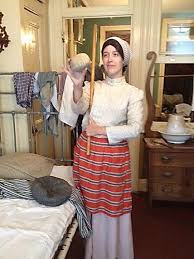 In preparation for a trip to the Tenement Museum to meet a recent (historical) immigrant, Victoria Confino, fourth graders spent some time looking at primary source documents. Using the documents, they started to build an understanding of who Victoria was and what her life was like. This also led to more questions.
In preparation for a trip to the Tenement Museum to meet a recent (historical) immigrant, Victoria Confino, fourth graders spent some time looking at primary source documents. Using the documents, they started to build an understanding of who Victoria was and what her life was like. This also led to more questions.
 Ezra describes this process with:
Ezra describes this process with:
At first I thought, “Oh this is just some random girl who immigrated from a random town.” But now I’m thinking “Wow! Learning about this girl can teach us a little more about immigration!”
An analysis of some primary source documents by Yves:
The information I got about Victoria Confino was as follows: Age of 10 Lived in Macedonia Came to the U.S. with 4 (maybe 5) family members I had a couple of questions. First why is Victoria’s father’s name not on the ship manifest, didn’t he come with her? Why did the place Victoria came from get changed from Macedonia to Patras? My understanding of Victoria changed from curious to very sad. In the first document it looked like everyone was miserable. Also, her father was not on the ship manifest, which implies that she either left him behind or that he had died. It was not a happy story.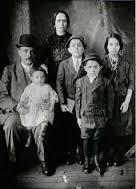
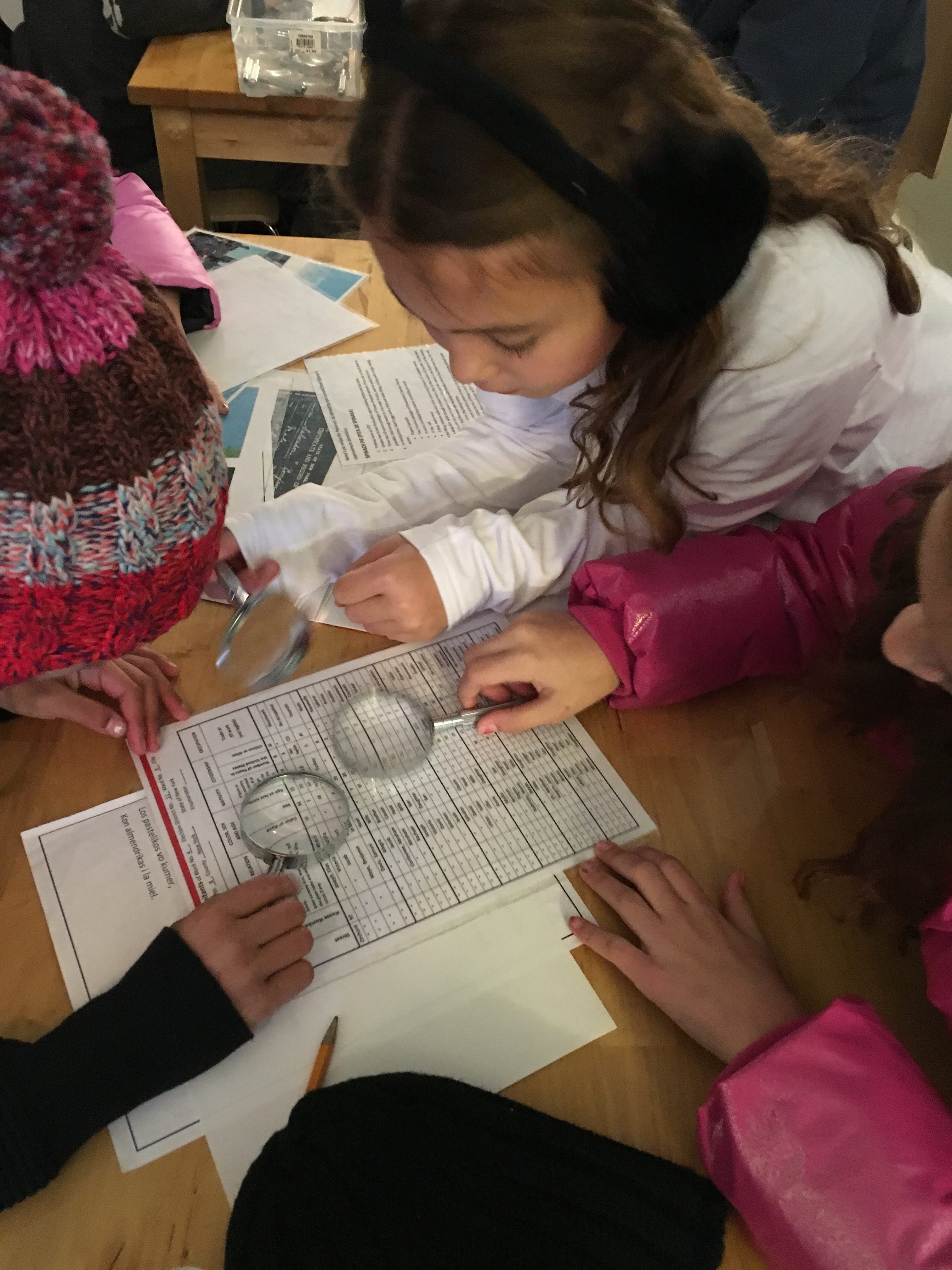
More document analysis by Asher:
I was able to gather the dates that documents were made on, who her family members were, How she did as a student and what it looked like in her home country and her age. Victoria is ten years old. Her family members were Rachel, David, Saul and Isaac. Rachel and Saul were her parents. The rest were her siblings according to the documents. The ship manifest was made in 1908. Her home country had a lot of trees and buildings. Where she lives is an island because it’s surrounded by water. Victoria is a b+ student according to the school report. She was present at school for 16 days which makes me think that she was focused on jobs she had to do. One question I have is why her country was crossed out on the ship manifest sheet. Another question I have is if not being able to take in a boarder was difficult on Orchard Street and that is why they moved to the uptown area.
On Monday, January 9th, our class went to the Tenement Museum to meet Victoria. We split up into two groups. One group simulated being a Russian family looking for a place to live after passing inspections at Ellis Island, the other group posed as an Italian family. Below are some news articles describing the scenes.
One question I have is why her country was crossed out on the ship manifest sheet. Another question I have is if not being able to take in a boarder was difficult on Orchard Street and that is why they moved to the uptown area.
On Monday, January 9th, our class went to the Tenement Museum to meet Victoria. We split up into two groups. One group simulated being a Russian family looking for a place to live after passing inspections at Ellis Island, the other group posed as an Italian family. Below are some news articles describing the scenes.
Bye-bye Russia and Hello America!
By Sam NEW YORK – January 9, 1916 A Russian family was looking for a tenement in the Lower East Side. The Russians wanted to know about an American life. They came across a girl named Victoria Confino. She was 11 years old when she moved from Kastoria to America and since she did not know any English she was in second grade. “I don’t understand why I have to read such kids’ books,” she said. They live in a settlement house. A settlement house was a social work organization that helped new immigrants settle in New York. The tenement was very small and Victoria had 10 brothers so it was very hard for them to squeeze in. They did not get a lot of food. Victoria kept saying to the Russian family, “Next time you visit I will bring something for you guys to eat.” Victoria came from a place where they did not have school and where they had servants, so it was very hard for her to move to a place like New York. “We could do whatever we wanted,” she said when she was talking about her life back home. Victoria has this coal to help keep her kitchen stove hot. Sometimes her brother runs around the floor so Victoria has to keep an eye on him so he does not burn himself on the kitchen stove. “Watch out!” The Russian family learned that life in America can be hard. Even though it was hard to live in a tenement, the Russian family decided to live next to Victoria.VICTORIA LENDS A HAND
by Miles NY NY-Monday at 97 Orchard St., Sheri, a social worker, escorts an Italian family to Victoria Confino´s house because they were looking for a home. They went to Confino because she was a true New Yorker and has been here for awhile. They walked into a creaky smelly dull brown house. There were things like shoes strewn across the floor. It was a very messy house but they just dealt with it. The family seemed to be very interested in jobs. “My job is at the factory, I make aprons,” Victoria said. They needed a job to make money to buy the essentials. Play it safe in New York. “It’s a shady place out there and you’ve got to be prepared,” explained Victoria. The children’s guardians had a keen interest in their children’s education as well. Victoria went to PS 64. She seemed to like it alot. They considered going there. They had to remember, Victoria had been there way longer than them and she knew best. “Where do you get food here?” they asked. “For meat you go to the butcher and for fruits and veggies you go to the pushcarts outside.” “You need to haggle for the best prices with sales people because lots of things are overly priced,” explained Victoria. “ It’s like limbo you bargain how low can you go!” “Thank you for coming,” Victoria exclaimed as they left. “Thank you.” they said, leaving the damp, dank, dark tenement.
The Story Of Victoria Confino
by Alex Amorosino NY NY-January 9, 1916 a group of Italian newcomers went to Victoria Confino and her family’s house. They went to learn somethings about America and ask her some questions. They went to learn how to survive in the New World. America. Victoria Confino was born in Kastoria, Greece on January 3rd in 1903. While living in Kastoria, Victoria and her family were wealthy Sephardic Jews. She had 3 maids and lived in a big house. Her life changed drastically when she immigrated to America. In 1913 Victoria immigrated from Kastoria to America because of war and a fire that destroyed her house. Victoria and her family join their dad and brother who had already immigrated earlier. They immigrated without the rest of the family because they did not have enough money to bring them all to America. When Victoria moved to America she felt sad. Sad because she was starting life over and left all her friends behind. She felt hungry because the food was horrible in storage and she barely ate it. She felt sick because she was just on a 20 day boat ride and was rocking the whole time. Over the time at America things slowly got better. Victoria’s tenement in America is on 97 Orchard Street on the fifth floor. Her family pays $14 a month for rent. Victoria has a messy small tenement, so small she has to sleep on the floor (not so much better than her old house). Victoria’s favorite part of the tenement is the water. They now can turn a handle and the water comes to them instead of bringing buckets to a lake to fill up and carry back home. Some things are better in Victoria’s life in America and some things are not.Victoria Has A Visit
By Setsuko Bey NY, On January 9, 1916 a Russian family went to visit an immigrant named Victoria Confino who has been living in NYC for three years. Victoria is from Greece. Victoria is a big sister of three brothers. She is 14. Victoria also sleeps on the floor of the kitchen, because she doesn’t want to share a room with her stinky brothers! She lives with six people in a two bedroom tenement. She has a job sewing clothing. “I wish I had my own room,” Victoria said in a sad voice. The family that visited Victoria were looking for a house to stay in because they just came to NYC. Victoria hadn’t cleaned her tenement so it was very messy, but the Russian immigrants didn’t care. Some thought it was nice, some thought it was cozy. Victoria and her family live on 97 Orchard Street. Their baths were in the kitchen. Clothing was hanging from the ceiling. There were antiques everywhere. “There was also some coal in a bucket,” said Victoria. Victoria has to take care of her siblings, because she is a grown up. Once you reach twelve you are considered an adult. Victoria is in second grade because she doesn’t really know how to write or read. When she was twelve she was in kindergarten! “I have no friends because I’m twelve,” exclaimed Victoria. The Russian family liked Victoria’s house, they decided to live there.]]>"Democracy means…" Podcast
Deborah and Joel’s Fourth Grade class began our study of the 2016 United States Presidential Election by asking the question, “What does democracy mean to you?” When wrapping up our studies in December, after months of thinking, we reflected once more on the question. Here are our collected answers!]]>
Good-Bye 2016: A Week in Photos
MONDAY
Fourth graders create a post-it wall expressing ideas and concerns about our country, our earth, our lives together.
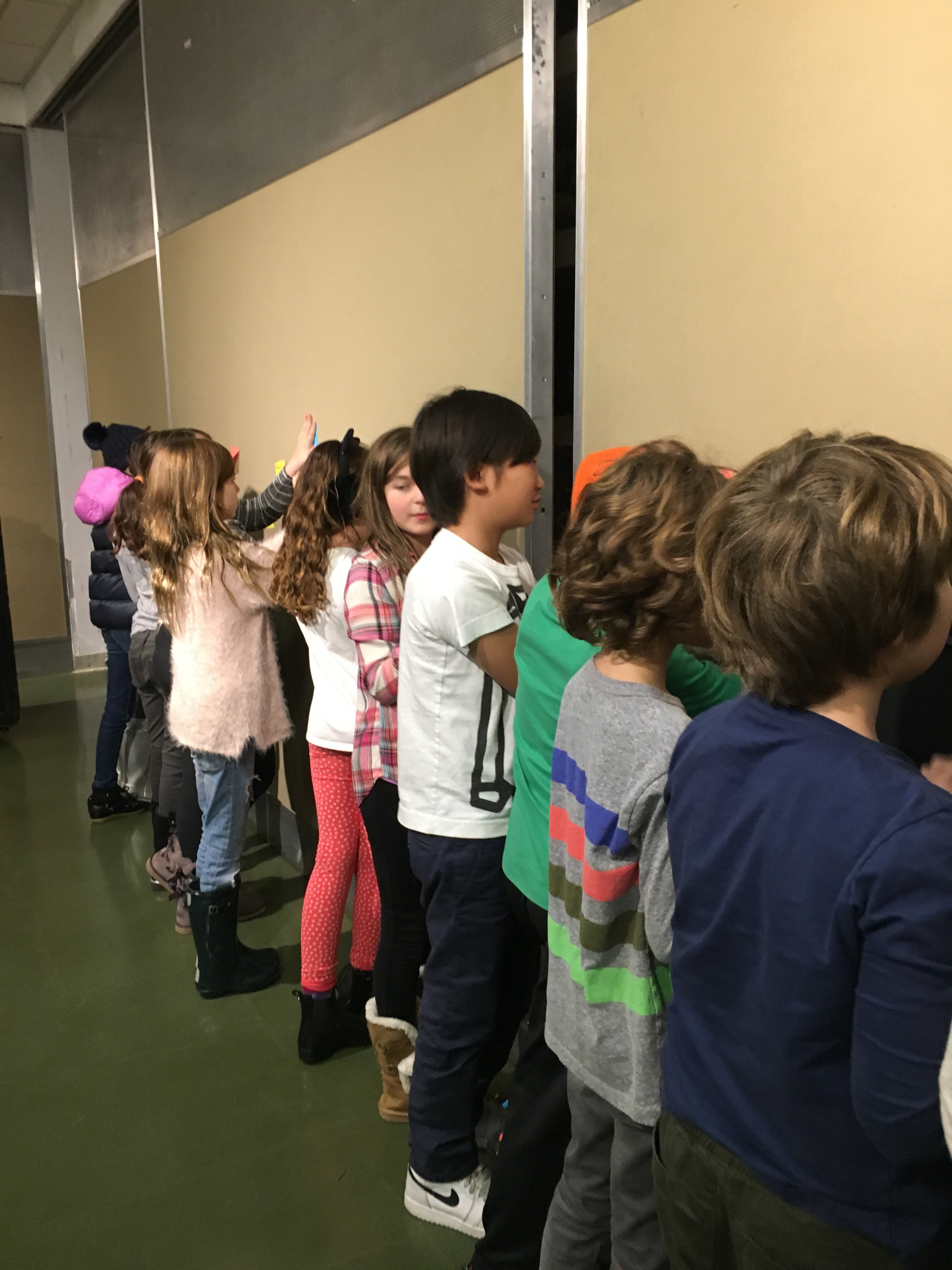 TUESDAY
As journalists, fourth graders visit the post-it wall installation in the Union Square subway station. They take notes and interview people walking by about their views on the presidential election and the future.
TUESDAY
As journalists, fourth graders visit the post-it wall installation in the Union Square subway station. They take notes and interview people walking by about their views on the presidential election and the future.
 WEDNESDAY
Fourth graders visit the seventh grade’s Colonial Museum. Here, a lesson on the Battle of Brooklyn…
WEDNESDAY
Fourth graders visit the seventh grade’s Colonial Museum. Here, a lesson on the Battle of Brooklyn…
 THURSDAY
A good way to process all of these experiences is to run around outside with a hula hoop.
THURSDAY
A good way to process all of these experiences is to run around outside with a hula hoop.
 FRIDAY
For morning work, students found notes of appreciation written by their classmates (hanging from the ceiling).
FRIDAY
For morning work, students found notes of appreciation written by their classmates (hanging from the ceiling).
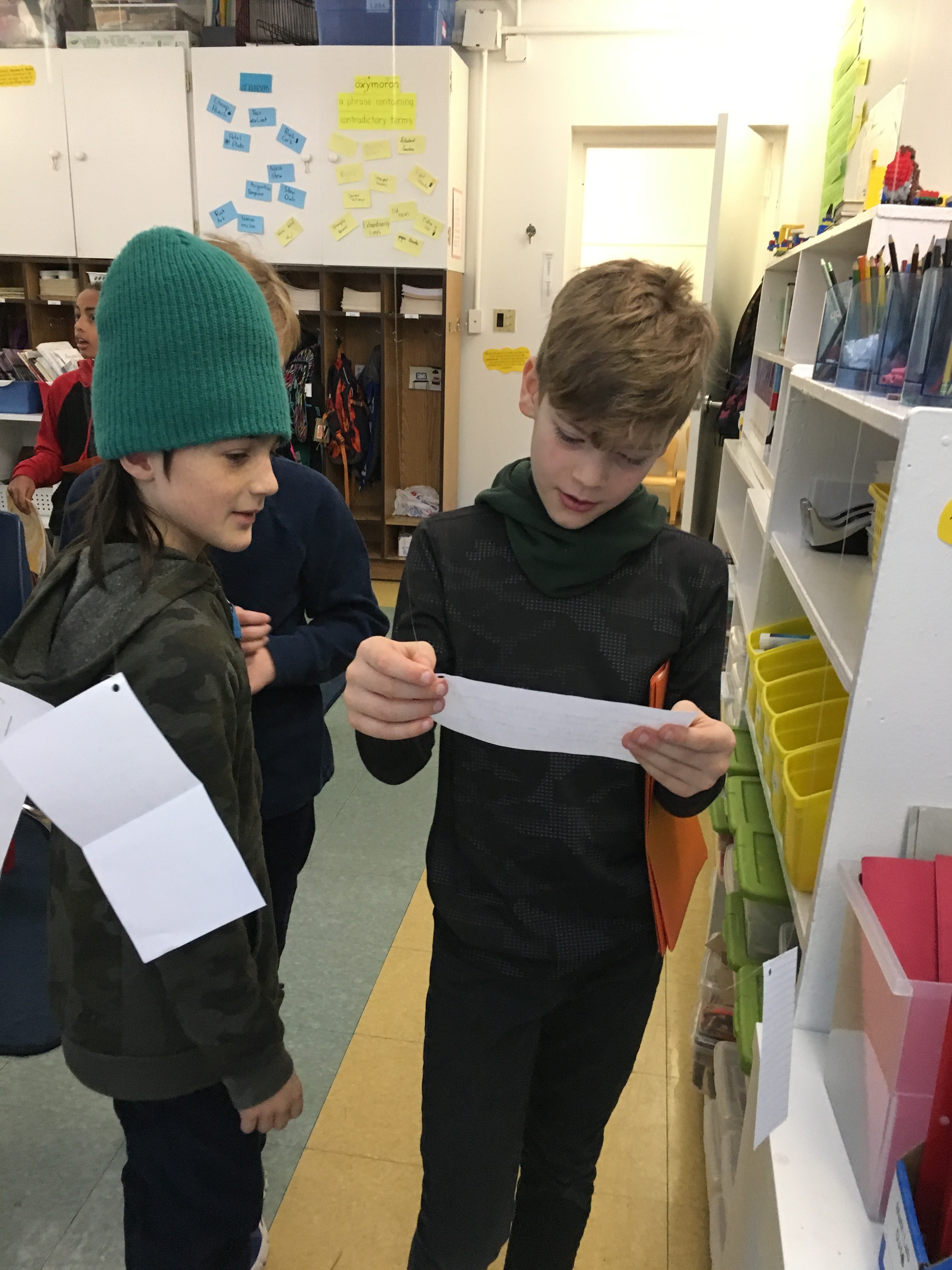 Then it was buddy time at the high school. First a game of tag…
Then it was buddy time at the high school. First a game of tag…
 Then a mannequin challenge…
Then a mannequin challenge…
 After the all school assembly, it was time for a little party in our classroom. First a game of pin-the-nose-on-the-snowman…
After the all school assembly, it was time for a little party in our classroom. First a game of pin-the-nose-on-the-snowman…
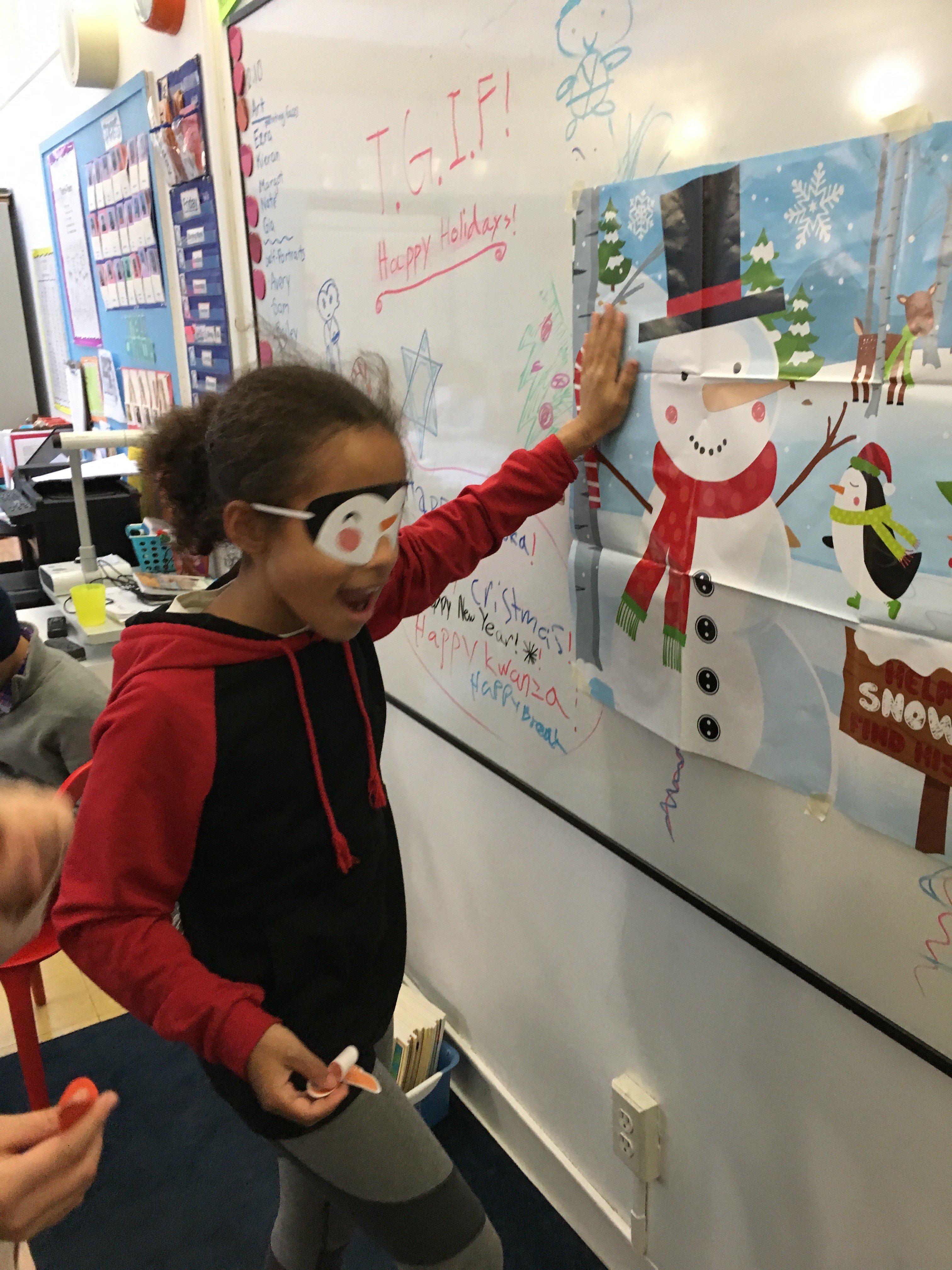 Then TREATS!
Then TREATS!
 So long 2016. Hello 2017!!]]>
So long 2016. Hello 2017!!]]>
